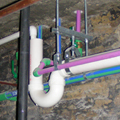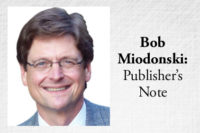
Graywater systems recycle water for non-potable uses.
At a symposium that showcased water-saving technologies, 84-year-old “eco-pioneer” S. David Freeman claimed we don’t suffer from a shortage of water in this country; we suffer from an abundance of waste.
“The answer to the water problem is to reuse it,” Freeman said. “It’s that fundamental. A graywater system in Los Angeles would nourish native plants [not grass]. We should reuse water instead of letting it go out to the ocean. Yet, there’s no lobbying effort to do so.”
About 180 plumbing engineers, code officials, contractors, inspectors, manufacturers and labor leaders attended the International Emerging Technology Symposium, a two-day event in May in Ontario, Calif., sponsored by IAPMO and World Plumbing Council. In his keynote speech (www.youtube.com/user/IAPMOGroup), Freeman said the technology to recycle water is neither complicated nor new, although installing it would require massive investments in infrastructure.
Such investments would result in substantially higher water rates. Freeman anticipates tremendous public resistance to these increases. The upside for the plumbing industry would be that these projects would result in a huge source of activity for people who manufacture, distribute, specify and install pipe.
Freeman, whose water conservation efforts date back to the Carter administration, supervised the giveaway of water-saving toilets in Los Angeles in the 1990s. As a moderator for the symposium, I was surprised to hear him take on leaders of the green movement.
“I’m angry at the green movement because they talk out of both sides of their mouth,” he said. “They talk green from one side of their mouth and don’t speak up to support raising water and energy rates we need to invest in our infrastructure. All the yakking in the world won’t do any good if the money isn’t there.”
Political leaders do not take action on their own, he said. We have to make them do it.
“It’s up to us who know something about the subject matter to speak to our legislators with hard facts and specific programs,” Freeman said. “The attitude of most engineers is that politics is dirty, but it’s going to continue to be dirty until we get involved.”
What Freeman failed to mention is that a significant amount of behavior modification would have to take place before consumers accept recycled water and use it efficiently. Also, Freeman’s speech undersold the extent of our water conservation accomplishments.
So, while I don’t agree with everything he had to say, I fully support Freeman’s call to action to members of the plumbing industry.
“Those of us who know the most about water are the ones who say the least,” Freeman said. “The airwaves are dominated by people shooting their mouths off who don’t know what they’re talking about. We’re just too damn polite. That’s our problem.”
Since Freeman’s speech, members of the plumbing industry have become more outspoken, primarily in their reaction to the Department of Energy’s proposal to limit shower systems to a single showerhead. Engineers and others must continue to speak up to make sure their expertise contributes to solutions to water shortages and waste.

